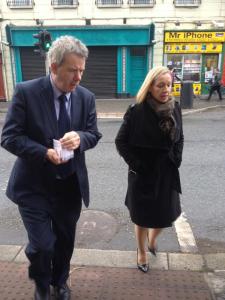
Paul Hayes of An Táin Arts Centre
With 2016 not far away, we can expect to see many centenary projects gearing up and preparing for performances and events to mark the Centenary of the Easter Rising. Among them is a new initiative from An Táin Arts Centre in Dundalk which will see a new piece of theatre devised by participants in a process which will start next Wednesday night and culminate with performances in An Táín at Easter next year.
Managing Director, Paul Hayes explains: “We’re conscious that the Town Hall, where An Táin is based, is a building which has a special resonance with the events of 1916 in Dundalk. It was here that Pádraig Pearse was to have addressed an audience around the time of the Rising, and it was here that Dundalk Urban District Council discussed the events in Dublin and Dundalk at their subsequent meeting. With that in mind, An Táin Arts Centre is inviting people from the town and throughout Louth to work with us in devising a new way of looking and recounting what happened in Dundalk nearly 100 years ago.”
The genesis of the initiative was meeting between County Arts Officer, Brian Harten, Paul Hayes from An Táin Arts Centre, and Declan Mallon, Upstate Theatre project, based in Drogheda. At that meeting, it was decided to create a new recounting of the events which took place in Dundalk in 1916. Upstate Theatre Project has long experience of working with communities to develop film and drama productions, where the stories, and the way of telling those stories, are shaped by the community participants themselves.
As Declan Mallon says: “We don’t do re-enactments. What we aim to do is to unearth people’s stories, and present these in new and innovative ways.”
Declan Mallon and Paul Hayes were behind the acclaimed Ship Street Revisited, which saw a dilapidated street in Drogheda transformed into an outside stage for stories and performances informed by the memories of past residents of the street. Another of Upstate Theatre’s productions, The Far Side, was described by The Irish Times as “hilarious and heartbreaking, simple and surreal.” And so the people behind these productions are behind the new initiative for An Táin Arts Centre.
“We’re inviting people to join us in the Arts Centre in Crowe Street on Wednesday October 7th at 7pm”, says County Arts Officer, Brian Harten.
“What will eventually be presented in April will be informed, to a large extent, by the views, stories and questions of the people who come along. If you can sing or act, great. If not, but are interested in 1916 in Dundalk, come along anyway. We want people to be involved and to help mould a re-telling of a momentous event in Irish history”









